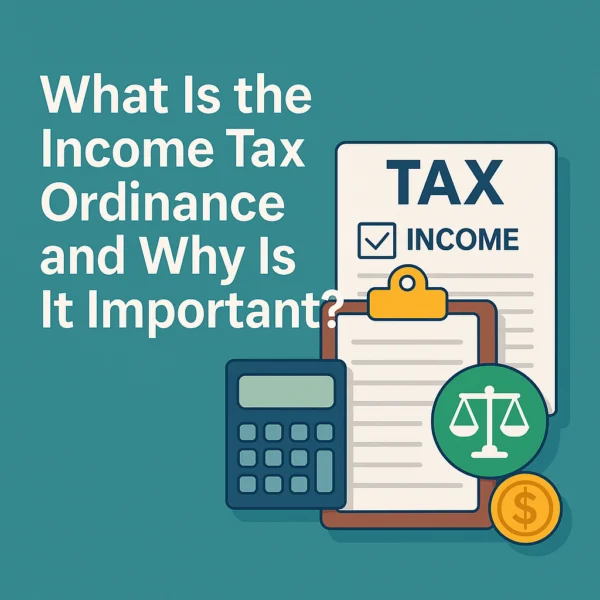In today’s financial world, paying taxes isn’t just a civic duty—it’s a legal responsibility. For Pakistani citizens and businesses, the framework that governs this responsibility is the Income Tax Ordinance, 2001. It defines how income is taxed, who pays it, and the rules that keep the system in motion.
This guide dives deep into what the Income Tax Ordinance is, why it plays such a critical role in Pakistan’s economy, and how thefirstcallsol makes it easier for individuals and companies to stay compliant.
[toc]
Income Tax Ordinance, 2001 — A Quick Overview
Enacted by the Government of Pakistan, the Income Tax Ordinance, 2001 replaced older, outdated tax laws with a streamlined legal framework. It is administered by the Federal Board of Revenue (FBR) and applies to all types of taxpayers—residents and non-residents, individuals and corporations alike.
Rather than being just a set of tax rates, this ordinance covers the entire taxation process, including:
- Definitions of taxable income
- Tax rates and slabs
- Filing requirements
- Audit procedures
- Legal consequences for evasion or errors
It’s not just a legal document—it’s the spine of Pakistan’s direct taxation structure.
Why the Income Tax Ordinance Is Essential
Builds Government Revenue
One of the primary roles of the ordinance is to facilitate government funding. Taxes collected under this law finance public projects like roads, hospitals, schools, and disaster relief efforts.
Without this legal structure, collecting revenue in a systematic way would be nearly impossible.
Promotes Fairness and Structure
The ordinance brings consistency and fairness to how income is taxed. Whether you earn a salary or run a multinational company, you’re subject to the same legal rules—minimizing chances of bias or selective taxation.
Encourages Documentation and Transparency
By requiring income declarations and wealth statements, the law indirectly supports a documented economy. It combats tax evasion and promotes financial transparency, which is vital for national growth and investor confidence.
Key Elements Defined in the Ordinance
Taxpayer Categories
The ordinance identifies different types of taxpayers, each with unique responsibilities:
- Salaried individuals
- Business owners
- AOPs (Associations of Persons)
- Companies
- Non-resident persons with Pakistani income
Types of Taxable Income
You’re liable to pay tax under the ordinance if you earn income from:
- Employment
- Commercial activities
- Investments
- Rental properties
- Capital gains
- International income (if you reside in Pakistan)
Tax Benefits & Allowances
To reduce the burden on compliant taxpayers, the ordinance permits deductions and tax credits for:
- Zakat contributions
- Charitable donations
- Education expenses
- Green energy investments
- Tax already deducted at source
Compliance: What Taxpayers Need to Do
Every year, eligible taxpayers must:
- Register on FBR’s IRIS portal
- File an income tax return
- Submit a wealth reconciliation statement
- Pay outstanding tax amounts (if any)
Missing deadlines or providing incorrect data can attract penalties or legal actions.
To avoid these issues, many turn to professionals like thefirstcallsol, who handle the complete process—from documentation to dispute resolution.
How thefirstcallsol Makes Tax Compliance Simple
Staying on top of tax laws can be overwhelming. That’s where thefirstcallsol steps in. They provide expert consultancy and practical solutions tailored to your needs.
Their services include:
- Tax registration for individuals and businesses
- Income tax return filing
- Legal representation in case of notices or disputes
- Tax planning and advisory to minimize liabilities
- Ongoing support with tax amendments and law changes
Whether you’re a first-time filer or managing a complex corporate structure, thefirstcallsol ensures you never face tax issues alone.
Impact of the Ordinance on Pakistani Businesses
For businesses, the Income Tax Ordinance isn’t just a legal requirement—it directly influences daily operations. Here’s how:
- Payroll systems must deduct and deposit employee tax
- Business expenditures are reviewed for deductibility
- Withholding taxes on payments to suppliers must be recorded
- Accurate books of accounts are mandatory
- FBR audits may be triggered at any time
Complying with these rules not only avoids fines but also strengthens your reputation and enables better access to banking, tenders, and investors.
Adapting to Changes: The Ordinance Is Updated Yearly
Every year, the federal government announces budget updates that often amend tax provisions within the ordinance. These changes might include:
- New tax slabs
- Revised exemptions
- Updated withholding rates
- Sector-specific incentives
Failing to understand these revisions can result in unexpected liabilities. The tax consultants at thefirstcallsol consistently track these changes to keep their clients protected and up-to-date.
Conclusion
The Income Tax Ordinance, 2001 is much more than a legal formality—it’s the cornerstone of Pakistan’s tax ecosystem. By laying out clear rules and regulations, it helps ensure fairness, financial accountability, and national growth.
Whether you’re an employee, investor, or entrepreneur, knowing your obligations under this ordinance is essential. And when in doubt, thefirstcallsol is here to help—providing dependable tax solutions that ensure full compliance and peace of mind.
FAQs
Is filing a tax return mandatory for salaried individuals?
Yes. If your income exceeds the minimum taxable limit, you must file a return—even if tax has already been deducted by your employer.
What’s the punishment for false tax declarations?
Deliberate misstatements can lead to heavy fines, loss of filer status, audit investigations, and even criminal prosecution in severe cases.
Can non-residents be taxed under the Ordinance?
Yes, non-residents earning income in Pakistan—such as through investments or property—are subject to withholding and income tax under the Ordinance.
What services does thefirstcallsol offer?
From basic tax filing to handling complex audits and appeals, thefirstcallsol provides complete tax support for both individuals and corporate clients.
From basic tax filing to handling complex audits and appeals, thefirstcallsol provides complete tax support for both individuals and corporate clients.
Keep an eye on annual finance bills, FBR announcements, and work with advisors like thefirstcallsol, who proactively monitor all updates and guide clients accordingly.

